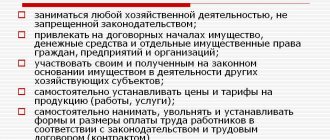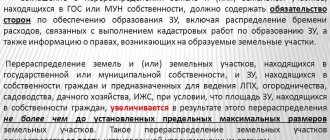We are accustomed to believing that until the age of 18, a child usually does not participate in public legal relations; his representatives are his parents and it is they who make decisions - which school to study at, which sections to attend, which clinic to register with, etc.
If the child is young, that is, under 14 years of age, then indeed the parents bear full responsibility for him and for organizing his upbringing. After turning 14 years old, he performs a number of responsibilities himself. The older a teenager gets, the wider the range of his rights and opportunities becomes, but at the same time the burden of responsibility increases. What rights do a 14-18 year old child have in Russia? About this in our article.
Constitutional rights and responsibilities of children in Russia
The rights of a child of any age are protected by the state especially carefully. In Chapter 2 of the Constitution of the Russian Federation there are several articles proclaiming the fundamental rights of the child:
- Article 38 talks about state protection of motherhood and childhood, the responsibilities of parents to care for their children and raise them;
- Article 39 contains provisions on social security, including for the purposes of raising children, on guarantees in the event of illness, disability, or loss of a breadwinner;
- Article 43 reflects the provisions for the general availability of free preschool, basic general and secondary vocational education in state and municipal institutions. From the same norm follows the obligation of children to receive, and the responsibility of parents, to ensure that they receive basic general education.
Other articles of the Constitution of the Russian Federation, which apply equally to adult citizens of Russia and children, enshrine the inadmissibility of violence, cruel treatment, the protection of personal dignity (Article 21 of the Constitution of the Russian Federation), the right to privacy, personal and family secrets (Article 23 of the Constitution of the Russian Federation), the right to health care and free medical care (Article 41 of the Constitution of the Russian Federation).
Along with the norms of the Basic Law, a number of Federal laws of the Russian Federation provide for state measures to protect children from information harmful to them (propaganda and agitation of national intolerance, violence, advertising of tobacco products and alcoholic beverages, etc.). For example, this is stated in Art. 14 of the Federal Law of July 24, 1998 No. 124-FZ “On the basic guarantees of the rights of the child in the Russian Federation.
These are general articles of Russian legislation on the legal capabilities of children from 0 to 18 years old. Any child under the age of majority has these rights. The older children get, the more “special” rights and responsibilities they have.
The legislative framework
The rights and responsibilities of minors are established by law. The main regulations that regulate the protection of adolescents have been in force for a long period of time. Among them:
- Convention on the Protection of the Rights of the Child.
- Constitution of the Russian Federation.
- Family code.
- Housing Code.
- Labor Code.
- Civil Code.
- Guardianship law.
- Education Act.
- Other regulations governing the protection of the rights of minors.
Information about the rights of adolescents should be freely available. Educational organizations are required to conduct lessons aimed at improving the legal literacy of minors.
Rights and responsibilities of a child from 14 years of age
The main responsibility upon reaching this age is to obtain a passport of a citizen of the Russian Federation. In accordance with Art. 1 of the Regulations approved by the Decree of the Government of the Russian Federation dated 07/08/1997, a passport is the main document proving a person’s identity; its receipt is mandatory for those who live in Russia upon reaching 14 years of age. This must be done within 30 days of your 14th birthday. The teenager performs this duty together with his parents: they are the ones who must help the child collect documents (a receipt for payment of the state fee will be needed), monitor his application to the Federal Migration Service or the MFC (usually the legal representative accompanies the minor applicant). In this case, the right to directly receive a passport belongs to the child who puts his certifying signature.
How to get a passport at 14 years old, what documents are needed.
Responsibility for failure to receive a passport is provided for by administrative legislation, but a teenager cannot be subjected to it due to under 16 years of age. But parents bear such responsibility. According to Art. 5.35 of the Code of Administrative Offenses of the Russian Federation, legal representatives may be fined for improper protection of the rights and interests of children.
Upon reaching the age of 14 and receiving a passport, a teenager’s range of rights expands significantly:
- part 2 art. 56 of the Family Code of the Russian Federation proclaims the child’s right to judicial protection. If a teenager believes that his rights and interests have been violated by any of his relatives or other persons, he can exercise the right to independently apply to the court with any statement, while written or other consent from adults is not required. Depending on the situation, as part of the consideration of the application by the judge, representatives of the guardianship authorities, employees of the department for minors of the Ministry of Internal Affairs and other law enforcement agencies may be involved in the proceedings.
- in accordance with Art. 142 of the Family Code of the Russian Federation, upon his application the adoption may be cancelled. We are talking about situations where a child’s rights to respectful treatment in the family, interests in studies, and sports are violated by adoptive parents. The court is obliged to consider such an appeal, even if it is filed without the knowledge of legal representatives.
- Article 62 of the RF IC provides a number of rights in relation to one’s own children – in the event that the teenager himself is a parent (to live with the child, to participate in upbringing along with the guardian, to demand paternity establishment through the court, etc.).
- in accordance with Art. 54 of the Family Code of the Russian Federation, a child has the right to count on being raised and living in a family with his parents.
Question: Does a 14-year-old or 16-year-old have the right to live alone?
In accordance with Art. 20 of the Civil Code of the Russian Federation, the place of residence of a child under 14 years of age is the home of the parents, that is, until this age, living separately is impossible. The law does not prohibit the separation of older children, but in each specific case the guardianship authorities are obliged to check whether the teenager’s move was not forced, provoked by the parents, or whether there was a family conflict. If such negative facts are not revealed, there are no obstacles for the teenager to live separately, but parents must continue to control his behavior and take care of him, participate in his upbringing, support him, etc. Failure to fulfill these obligations may result in administrative liability or the initiation of a claim for restriction (deprivation) of parental rights.
Additional legal opportunities for adolescents 14 years of age and older are provided for by separate Federal laws of the Russian Federation. For example, children of this age can be participants in youth associations, the activities of which do not contradict Russian legislation - Art. 19 Federal Law dated May 19, 1995 No. 82-FZ “On Public Associations”. In accordance with Art. 2 Federal Law dated January 12, 1996 No. 10-FZ “On trade unions, their rights and guarantees of activity”, starting from the age of 14, a child can join a trade union.
Is it possible to participate in the voting?
Russians have active voting rights only at the age of 18, like citizens of almost all other countries in the world: it is believed that not before this time do people reach political maturity. By the way, in several countries the minimum voting age is 16 years old, but Russia, apparently, is still far from this. The age at which you can nominate your candidacy (this is already a passive electoral right) is even higher in our country: you can be elected to deputies from 21 years old, to governor from 30, to president from 35.
Property rights of teenagers 14-18 years old
In accordance with Art. 26 of the Civil Code of the Russian Federation, children from 14 to 18 years old, unlike minors, have the right to enter into transactions with the written consent of their legal representatives. If the written form was not followed but is subsequently approved by the parents, it is considered valid.
For example , 15-year-old Ivanov M.I. sold his headphones to another person through an online advertisement without the knowledge of his legal representatives. The buyer, upon learning that the seller was under 16 years of age, asked for written adult permission to complete the transaction. Since the headphones were a birthday present for M.I. Ivanov, his parents considered it possible to allow their son to dispose of his own property at his own discretion and wrote a written consent. The transaction fully complies with legal requirements and, if subsequently challenged in court, it will be recognized as valid.
Not only the persons involved in the legal relationship, but also the parents themselves can apply to the court to challenge such transactions.
At the same time, in some cases written permission is not required:
- Without the consent of adults, teenagers can freely dispose of their earnings, scholarships, and income from work. It follows from this provision that children, contrary to the opinion of some parents, are not obliged to give “their” money to the general family income, to help buy food, things, etc. They can give savings to adults only on a voluntary basis when they want to contribute to the financial well-being of the family.
- Minors aged 14-18 years have the rights of authors of works, opening deposits in banks, making small transactions and bearing independent responsibilities in such legal relations. From the age of 16, a minor can become a member of a cooperative. Parental approval is not required to exercise these rights. Small transactions include those provided for in Part 2 of Art. 28 Civil Code of the Russian Federation:
- household - for example, exchange of construction sets, books, etc.;
- aimed at receiving benefits free of charge (for example, receiving a gift as a gift, a birthday gift, etc.);
- management of funds provided by parents (“pocket expenses”).
The child bears sole responsibility for independent transactions, including damage caused by them. At the same time, in accordance with Art. 1074 of the Civil Code of the Russian Federation, part of the civil liability may fall on the shoulders of the parents if the teenager’s property is not enough to cover expenses.
The law allows parents who do not agree with the financial behavior of their children to apply to the court to limit the right of a minor aged 14-18 to manage money, providing evidence of unreasonable spending. There are examples in practice: legal representatives made a similar application when the child spent the entire scholarship, borrowed large sums for playing slot machines, online casinos, etc.
Emancipated teenagers are a separate category of children who have full legal capacity by law and bear full responsibility for transactions without the help of adults. In relation to them, parents cannot raise the question of limiting the disposal of money ; written consent for transactions of any kind is not required.
The decision on emancipation is made by the guardianship and trusteeship authority, and in case of objections from adults, by the court. In accordance with Art. 27 of the Civil Code of the Russian Federation, persons who have reached the age of 16, working under an employment agreement (contract) or engaged in entrepreneurial activity, as well as those who have entered into marriage, can be recognized as emancipated.
Remuneration for minors
Features of the calculation of payment for children (under 18 years of age) are reflected in the notice of the Federal Tax Service of the Russian Federation (No. ШС-37-3/10304, 08/31/2010), in the Labor Code of the Russian Federation (Article 271), and are also formed taking into account the system in force in the employing organization payment.
- The amount of earnings with a time-based payment option is affected by the duration of the activity. At the request of the administration and at the expense of the enterprise’s resources, a minor employee receives an additional payment up to the salary of employees of the same category with a standard daily workload (Article 271 of the Labor Code of the Russian Federation).
- In a piecework form of employment, earnings are calculated according to the current prices for the products produced. At the expense of its own funds, an enterprise can pay an employee up to the tariff rate for the difference in time for full and reduced daily employment.
- For citizens combining study and work , payment is also calculated taking into account output or time (worked). Additional payments are set at the discretion of the administration.
Attention! The employer cannot issue this category of employees a power of attorney to carry out operations involving the receipt of benefits, since minor citizens are not recognized as fully capable.
Teenage workers are entitled to paid leave once a year. The duration of rest is 31 days (calendar), and the time it is provided is determined by the employee’s needs (Article 267 of the Labor Code of the Russian Federation). The provisions of the Labor Code of the Russian Federation (Articles 124-126) in relation to persons under 18 years of age are prohibited:
- refuse to provide leave (annual);
- replace rest days with compensation (monetary);
- terminate your vacation (vacation) early.
Question: How is the accrual and payment of compensation for unused vacation upon dismissal to a minor employee who was employed in the main production activity on seasonal work reflected in the organization's accounting? View answer
Labor rights of adolescent children
One of the basic social rights of adolescent children is the right to work. By virtue of Art. 63 of the Labor Code of the Russian Federation, an employment contract can be concluded with a teenager at 14, 15, and 16 years old, subject to certain conditions:
- from 14 years of age - only with the written consent of one of the parents and the guardianship authority. Only light work that does not cause harm to the child’s health is allowed. If at the time of concluding an employment contract the child has not yet received general education, you can only work in your free time from school.
- from 15 years of age – it is possible to work without the written consent of adults. Only light work is allowed in free time from school (if general education has not yet been completed).
- from the age of 16 – a teenager independently enters into an employment contract; permission from the guardianship authority and parents is not required, and there are no restrictions on light work.
Many questions arise for parents who dream of sending their children to theater schools, organizing their participation in concerts and filming. This is also a kind of creative work for children, and often they are not yet 14 years old. For such situations, the fourth paragraph of Art. 63 of the Labor Code of the Russian Federation, which talks about the possibility of a child of any age participating in creative productions (works) at cinematography organizations, theaters, and circuses. You will need an employment contract, signed by the parent, as well as permission from the guardianship authority indicating the maximum working day for the child. Causing moral damage and damage to the health of the child must be excluded.
In accordance with Art. 92 of the Labor Code of the Russian Federation, for children under 16 years of age, the maximum duration of work per week cannot exceed a total of 24 hours. For those who are already 16 years of age but have not yet turned 18, this figure should not exceed 35 hours per week. If teenagers combine work and study, the maximum number of hours is halved.
By entering into an employment relationship, a teenager acquires special rights and responsibilities. So, by virtue of the provisions of Art. 21 of the Labor Code of the Russian Federation, an employee (including a minor) is obliged to perform labor duties in accordance with the scope established by the contract, treat work conscientiously, and observe labor discipline. Disciplinary measures may be applied to a teenager, as well as to other employees, on the basis of Art. 192 Labor Code of the Russian Federation.
The basic rights of a child working are the right to leave at any time for 31 days - Art. 267 of the Labor Code of the Russian Federation, the right to encouragement - Art. 191 of the Labor Code of the Russian Federation, the right to compensation for damage caused by the employer - Art. 232 Labor Code of the Russian Federation.
Typically, teenagers' work involves distributing leaflets, delivering food, and courier services. We often see grown-up children rushing on a scooter to quickly deliver pizza or rolls to customers. You need to know that the right to drive a moped (category “M”) is granted only to persons over 16 years of age (clause 1 of article 25, clause 2 of article 26 of the Law “On Road Traffic Safety” dated December 10, 1995 N 196-FZ ). Thus, at the age of 16, you can learn to drive and pass exams for an A1 and M license, which gives you the right to drive mopeds, scooters, and motorcycles with a volume of 50-125 cubic meters.
Let us remind you that moped drivers must ride in one row on the right edge of the roadway or in the lane intended for cyclists. If the moped driver does not interfere with pedestrians, he can drive along the side of the road (Section 24.7 of the Traffic Regulations). Control must be with both hands; transportation of people and large loads, unless provided for by the design, is prohibited. Violation of these rules may result in administrative liability in accordance with Chapter 12 of the Code of Administrative Offenses of the Russian Federation.
Question: Is it possible to get a license to drive a car at 16 years old?
No you can not. A driver's license to drive a car can only be obtained from the age of 18, although a bill is currently being discussed that would allow this to be done as early as 16. Such an exception may be introduced for officially employed, independent teenagers, while before reaching adulthood it will only be possible to drive a vehicle in the presence of an experienced driver, it is expected that a ban on driving on federal highways will be established. Driving a car from the age of 16 as a driver is possible only with training in driving a vehicle of categories “B”, “C”, “C1” (clause 21.4 of the traffic rules), that is, exclusively when an instructor is nearby. At the age of 17, they can be allowed to take the exam, but if they successfully pass the license, they will be issued a license only upon reaching the age of majority (Article 26 of the Law “On Road Safety”).
Documents required when applying for a job
To get a teenager to work you need:
- document confirming the identity of the person entering the organization (general civil passport);
- confirmation of education, receipt of a certain qualification or certificate of suspension of education;
- work book (if available);
- document of a participant in the pension system (SNILS), except for the situation of hiring for the first place of work;
- confirmation of military registration (for boys);
- permission of the parent (guardian), as well as the guardianship authorities, to employ a child under 16 years of age;
- medical certificate.
The procedure established by the Ministry of Health and Social Development of the Russian Federation (Order No. 302, 04/12/2011) provides for the mandatory medical examination of adolescents every year until they reach adulthood.
Attention! A medical examination of a citizen is carried out at the expense of the enterprise (Articles 69, 266 of the Labor Code of the Russian Federation). If a minor employee does not have a medical certificate, the management of the organization faces liability for an administrative violation (Article 5 of the Code of Administrative Offenses of the Russian Federation).
Criminal liability of teenagers
As a general rule, you can be charged with committing a crime from the age of 16. However, there are exceptions to this rule. So, in accordance with Art. 20 of the Criminal Code of the Russian Federation, for some acts (mainly for serious and especially serious crimes), a teenager faces criminal liability from the age of 14:
- murder, that is, intentionally causing the death of another person;
- intentional infliction of grievous harm or moderate harm to health;
- kidnapping;
- rape;
- theft, robbery, robbery, vehicle theft;
- extortion, deliberate damage to property by arson or hooligan motives;
- vandalism, aggravated hooliganism;
- participation in terrorist acts.
Read more about the types of criminal punishment imposed by the court on teenagers.
In each case where the accused is a minor, a special psychological examination is carried out, which reveals the presence or absence of deviations from the adolescent’s developmental norms. If the expert establishes that the accused has reached the age of responsibility, but due to his development did not fully understand and realize the consequences of his crime, there may be an exemption from criminal liability.
The criminal law has special rules for minors. Thus, their age is always a mitigating circumstance according to paragraph “b” of Part 1 of Art. 61 of the Criminal Code of the Russian Federation. They cannot be sentenced to imprisonment for minor crimes committed for the first time - Part 6 of Art. 88 of the Criminal Code of the Russian Federation.
Links to legislative acts
- Federal Law No. 124 “On basic guarantees of the rights of the child in the Russian Federation”
- Article 5.35 of the Code of Administrative Offenses of the Russian Federation. Failure of parents or other legal representatives of minors to fulfill their responsibilities for the maintenance and upbringing of minors
- Article 56 of the Family Code of the Russian Federation. Child's right to protection
- Article 54 of the Family Code of the Russian Federation. The right of a child to live and be raised in a family
- Article 1074 of the Civil Code of the Russian Federation. Liability for damage caused by minors aged fourteen to eighteen years
- Criminal Code of the Russian Federation Article 88. Types of punishments imposed on minors
Can a person be recognized as fully capable before the age of 18?
Practicing lawyer Elizaveta Khudyakova answers this and subsequent questions to the Federal News Agency .
As a general rule, a citizen is recognized as fully capable upon reaching eighteen years of age. In some cases, this age can be reduced:
— If a minor decides to enter into legal marriage. If the marriage is declared invalid by the court, the person loses his status.
— A minor over 16 years of age can be emancipated with the consent of his parents or by a court decision if he works under a contract or is an entrepreneur.
The right of the child: to study in the place of residence
Regulatory framework: ,
Parents can choose a garden near home or near work. The only important thing is that the institution is located in the same municipality where the child lives. For schools, we have a territorial principle: for each school there are designated houses that belong to it. Children who live in them have the right to enter the first grade at this particular school.
They are accepted into kindergarten without competition, but you have to wait your turn. It is also not possible to hold a competition or any other selection for first-graders. This is only possible for middle and senior management.
Only schools, lyceums and gymnasiums with in-depth or specialized study of subjects can accept the competition. This rule is regulated by the legislation of the constituent entities of the Russian Federation, so things may vary by region. Note! Next to such a specialized institution there must be an alternative regular school where you can enter without competition.
Marriage
In the family sphere, everything is less clear. The Family Code allows marriage from the same age of 18, but allows exceptions. Firstly, local governments have the right to allow marriage registration if the bride and groom are over 16, “if there are good reasons.” Such reasons may be the pregnancy of the bride, the prospect of the groom soon leaving for the army, the possibility, if registered, to improve the property status of a girl who already has a child, or the newlyweds living together for a long time. Secondly, the authorities of individual regions have the right to determine “special circumstances” under which it is possible to get married before the age of 16.






